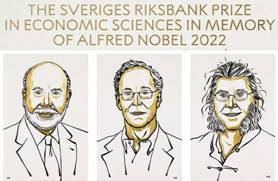Free Courses Sale ends Soon, Get It Now


Free Courses Sale ends Soon, Get It Now



Disclaimer: Copyright infringement not intended.
Context
Background and their Research
Why Banks Exist
Diamond and Dybvig developed theoretical models that explain why banks exist, how their role in society makes them vulnerable to rumours about their impending collapse and how society can lessen this vulnerability.
Bank runs
Significance of their Research
|
Prize in economic sciences is not a Nobel Prize The prize in economic sciences is not a Nobel Prize. In 1968, Sveriges Riksbank (Sweden’s central bank) instituted “The Sveriges Riksbank Prize in Economic Sciences in Memory of Alfred Nobel”, and it has since been awarded by the Royal Swedish Academy of Sciences according to the same principles as for the Nobel Prizes that have been awarded since 1901. The first prize in economic science was awarded to Ragnar Frisch and Jan Tinbergen in 1969. |
Trivia
Abhijit Banerjee


© 2024 iasgyan. All right reserved